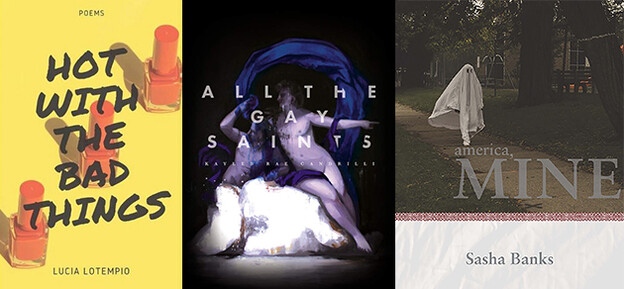
Worship the change
Kenna O'Rourke

Kenna O’Rourke reviews three authors’ debut collections.
Hot with the Bad Things, Lucia LoTempio (Alice James Books, 2020)
“Do you feel shame / when you are dead something always / lives on,” writes Lucia LoTempio in her collection on intimate partner violence, social media, and the patriarchal mundane. Tracking her own experience with abuse alongside the murder of a woman and her boyfriend in Geneseo, NY, by the woman’s ex-boyfriend, LoTempio gathers up letters to herself, bad-faith status updates, and anecdotal evidence into a compelling commentary on gendered violence. Dark but poignant, LoTempio’s poetry captures rape culture’s many-layered effects: “My capacity for imaging a violence flexes like a membrane. Like a girl.” She authors a poetics of reflective survival, recalling “I forget all the time (though it’s true) that the mouse is the most successful mammal on the planet.”
All the Gay Saints, Kayleb Rae Candrilli (Saturnalia Books, 2020)
Kayleb Rae Candrilli writes Aquarian love songs; queer guidebooks to rural America; studies in glitter, flesh, and transition. Their collection — much of which, they note, began as an ekphrastic exercise in response to the paintings of Hernan Bas — embeds all-caps questions in poem titles (“IF JULIET AND JULIET CHANGE THEIR NAMES TO ROMEO AND ROMEO DOES EVERYONE STILL DIE?”) and answers them slantwise with the speaker’s familial/gendered/embodied history (“In rural America / everyone is having an orgy in the bushes and calling it three Hail Marys.”). Emotion, elegy, and devotion bridge Appalachian landscapes and Philadelphian bedrooms: “I’m always high on pesticides and saber tooth tigers because time isn’t linear and death is one of the saints I pray to”; “My breasts disgust me deeply but I depend on them for a reason // to cry.” Candrilli writes through queer worry with an eye to the future, driven by love and just the right turn of phrase.
america, MINE, Sasha Banks (co im press, 2020)
“Once upon a time, Christopher Columbus sneezed and the constellations were formed as George Washington stood below them and chopped down a cherry tree to build the Arc,” says Sasha Banks in her gripping collection. Banks imagines a near-future where the American mythos is a faint memory — where the collapse of the state creates a new “uhmareka” grounded in black liberation. Historical figures haunt and laugh; victims lynched by police and civilians reappear; presidential rosters are erased letter by letter; “all / empires are made of paper and / damned religions.” In this new experiment filled with crows and spit-upon remnants of flags, the illusions of white supremacist hegemony are laid bare: “Before I knew It wanted to kill me, I wanted It to smile at me.”